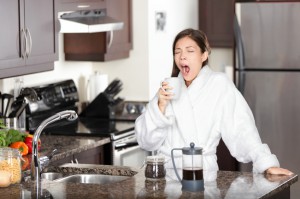I love coffee. I don’t just love it – I depend on it. As a full-time working mother of two young kids, my life is busy and I often don’t get enough sleep. Coffee keeps me going.

But I worry about the health effects of caffeine – and wonder if my lack of sleep isn’t partly caused by my caffeine “solution.”
As part of our series on sleep issues, I talked to Cynthia Moore, registered dietitian with UVA’s Nutritional Counseling Center.
Moore happens to be writing a book about sleep, and she answered my questions about caffeine and its effects on sleep and health.
Caffeine Q&A
First things first: In general, does the intake of caffeine in the morning affect nighttime sleep?
In my experience, not much. I think for most people, more than eight hours between the caffeine intake in the morning and bedtime means this will not be a large effect or influence.
However, studies have shown that caffeine dependence develops at relatively low daily doses and after short periods of regular daily use. Large sample and population-based studies indicate that regular daily dietary caffeine intake is associated with disturbed sleep and associated daytime sleepiness.
Most of the adults I know drink coffee. But they don’t all have sleep problems. Does caffeine alone interfere with sleep, or is it just based on individuals or amounts?
I think it’s well known to interfere with sleep for many people if consumed between 2-5 hours of bedtime. For some people 10 cups doesn’t cause jitteriness, because presumably they have a genetic predisposition that makes high caffeine consumption work. And for others just one cup causes specific cognitive or performance issues.
For some people with ADD or ADHD, caffeine actually is therapeutic for helping them calm down. So obviously, if it works to calm some people and energize others, it has variable influences among individuals.
I remember hearing a report on the news that caffeine can help people have better moods, but I also hear it can cause depression.
That may be explained in part by whether the individual has a genetic propensity to anxiety and stress or not. Those with pre-existing anxiety/stress sensitivity may feel the effects of stress hormones circulating longer and this may promote more anxiety; for others, it’s energizing.
Why does drinking coffee affect your sleep more as you age?
Caffeine is cleared from the body in part by kidney function, and as kidney function changes (one of the normal effects of aging) so too does the clearance for caffeine and its rate of elimination from the body.
How can you tell if your caffeine intake is hampering your ability to sleep?
Taking three days to wean off of caffeine and then at least another one-week trial off caffeine would help clarify if it’s interfering with your sleep.
What are the symptoms and signs that caffeine might be impacting your sleep?
The sleepiness and degraded function.
What should you do if you’re considering reducing your caffeine intake to help with sleep? When I don’t drink coffee, I get a headache.
It’s best to wean down over a week by using less of the caffeinated item (one cup instead of 2-3 cups) for 1-3 days and then one cup of half regular, half decaf per day or alternating with tea (generally less caffeine than coffee) for another 1-3 days. There are also some great warm morning beverage substitutes, instant Kaffix or Pero, and also blends you can drip filter such as roasted hazelnut fig blends.
If you have to stay awake for an important reason – work, school, caretaking, whatever – is there a better alternative to caffeine?
Turns out that the source of our calories can influence wakefulness. Protein is energizing – increases norepinephrine; high or refined carbohydrate is relaxing-increases serotonin. So having a lowfat protein food like tuna salad, baked salmon, grilled chicken. etc., would be a better choice if you need alert energy for the road or at home, rather than something like a pasta or a bread-intensive meal with a shake/dessert which would be more likely to promote drowsiness.
What kinds of problems can an adult face if not getting enough sleep?
The lack of adequate quality or quantity of sleep increases the metabolic changes that are linked to hypertension, obesity and pre-diabetes. A key concern with not enough sleep is the influence on brain patterns governing alertness, the increased likelihood of having or creating an accident, as well as the metabolic consequences of obesity, hyptertension and diabetes.

Are dark diet sodas, like Diet Coke and Caffeine Free Diet Coke really bad for your health as far as not being able to lose weight? There is a lot of hype about this subject, but I want to know if there is any truth behind the hype.